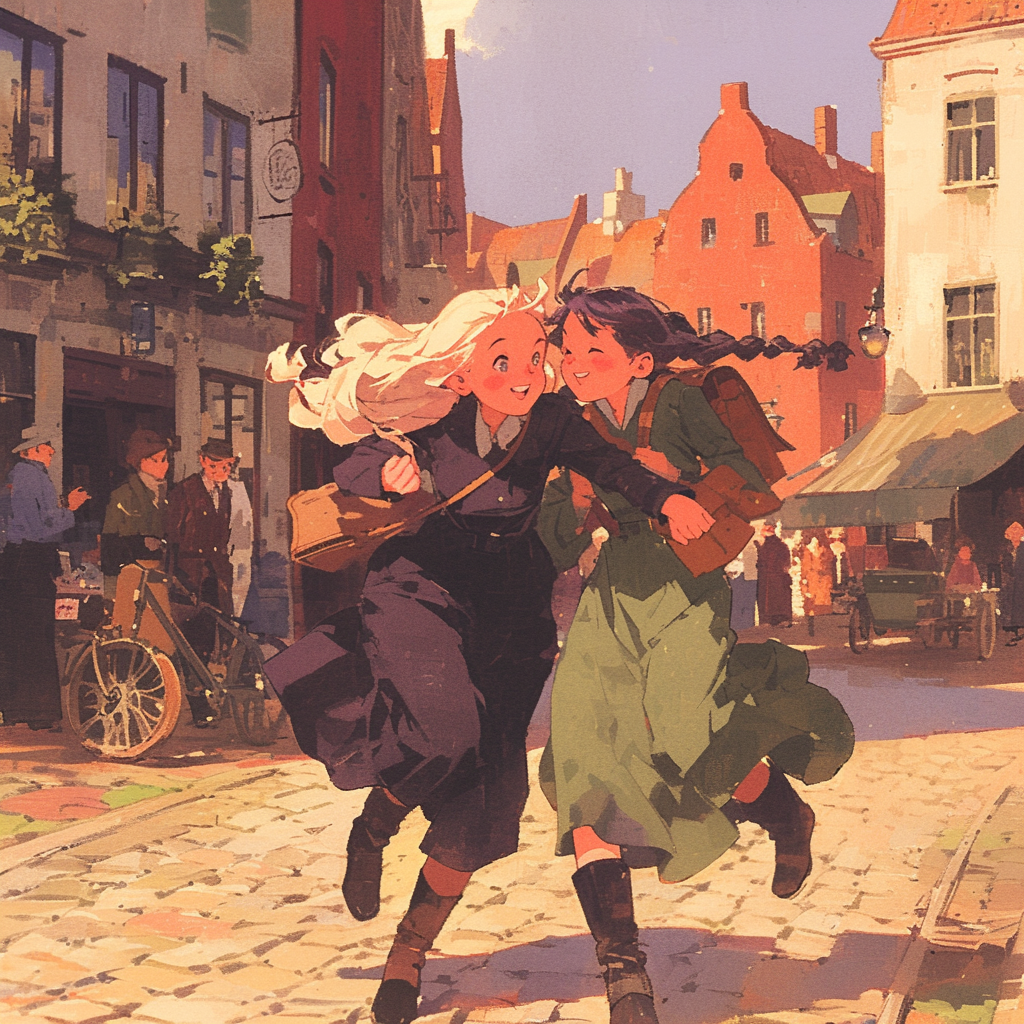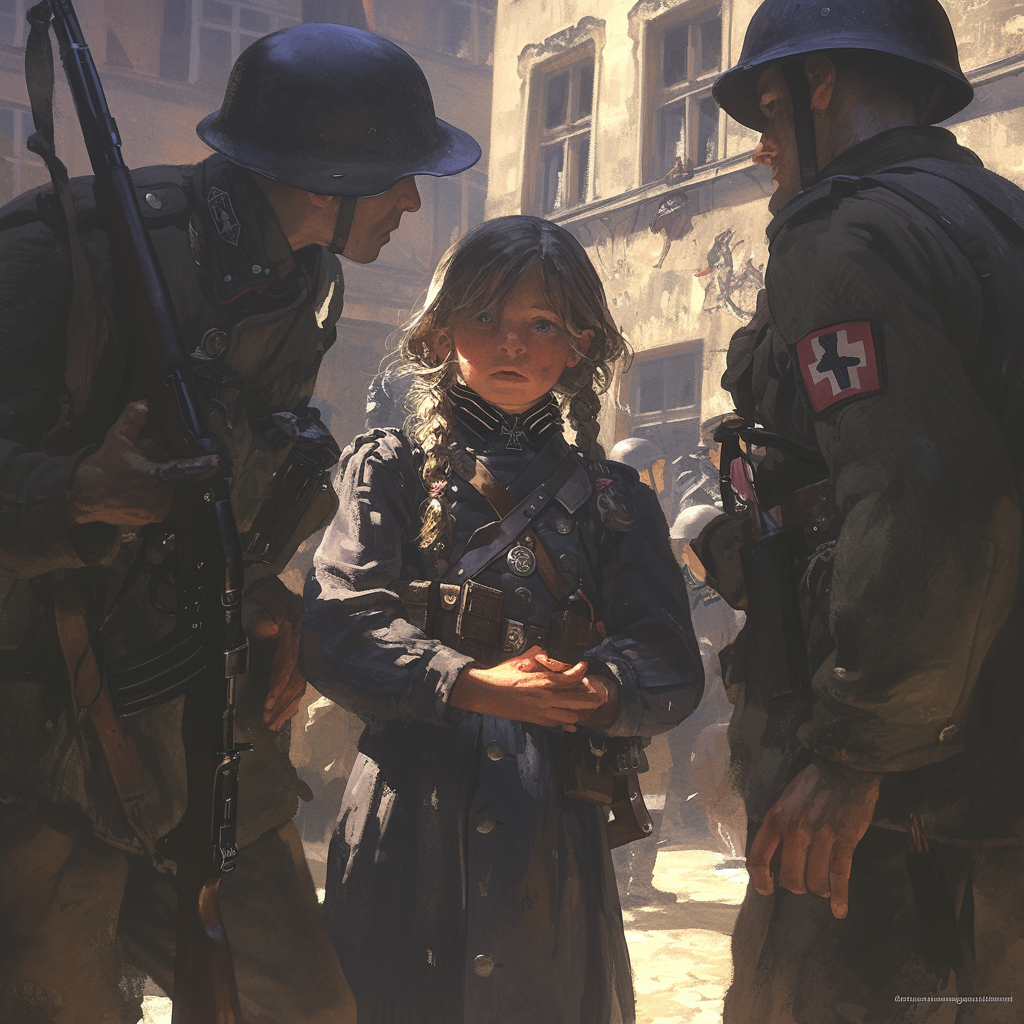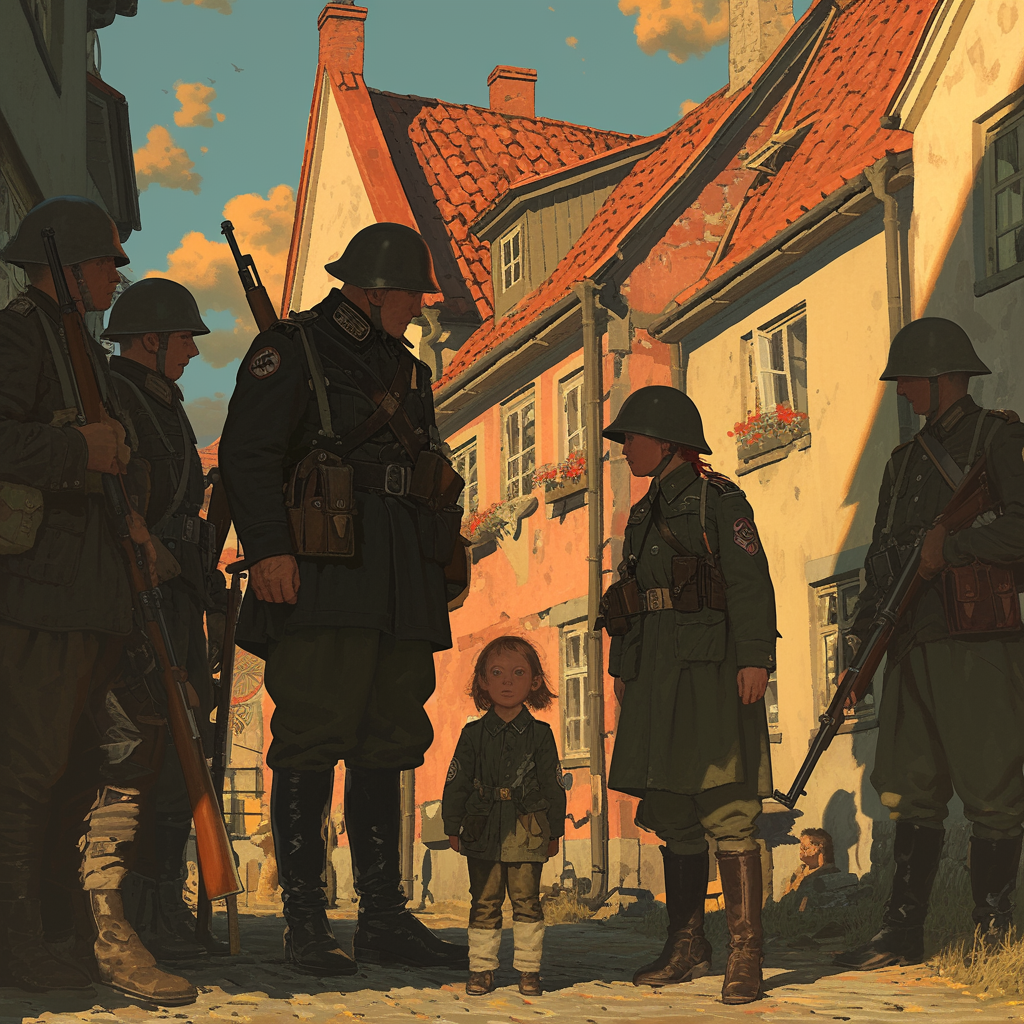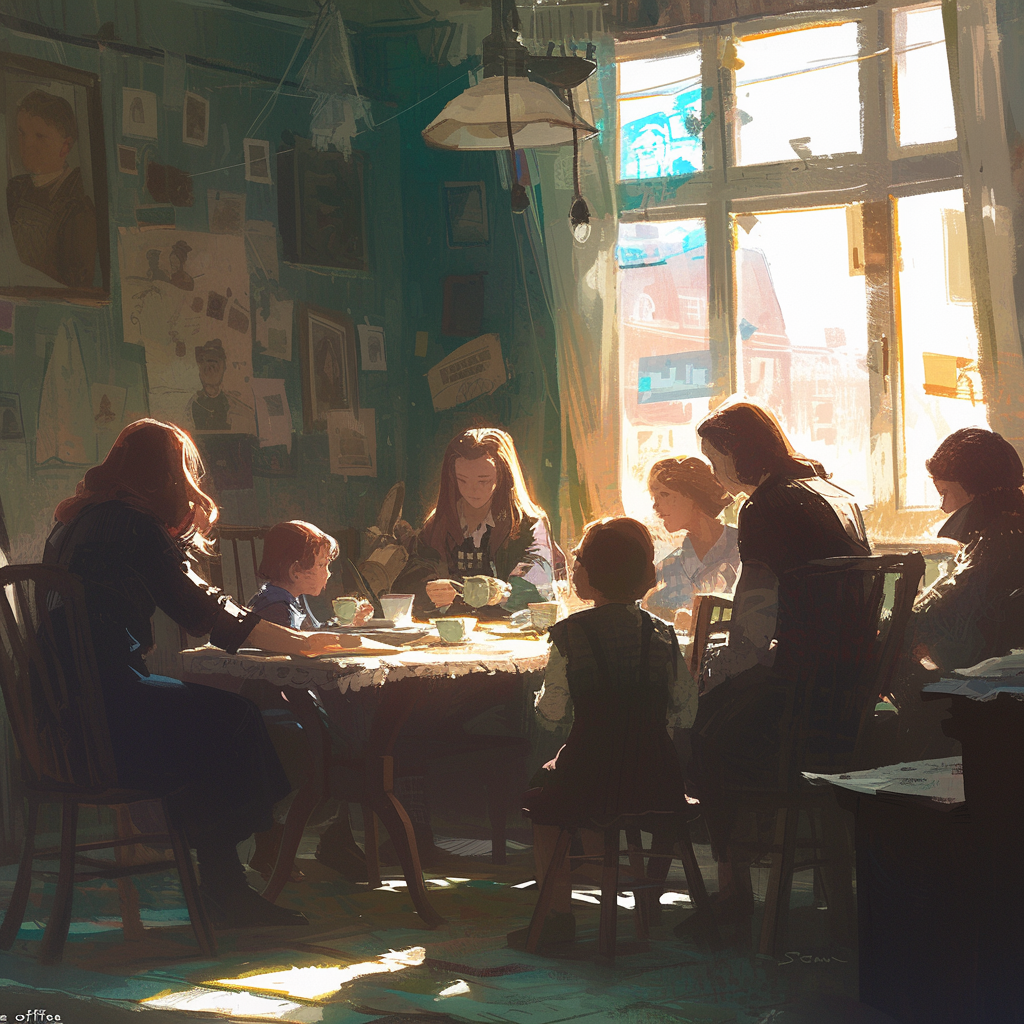[원서특강) Number the Stars (Lois Lowry) Chapter 1

About the Author
Lois Lowry is known for her versatility and invention as a writer and is the author of more than thirty books for young adults. She was born in Hawaii and grew up in New York, Pennsylvania, and Japan. After several years at Brown University, she turned to her family and to writing. She received Newbery Medals for two of her novels, Number the Stars and The Giver, and has received countless other honors, among them the Boston Globe-Horn Book Award, the Dorothy Canfield Fisher Award, the California Young Reader's Medal, and the Mark Twain Award. Her first novel, A Summer to Die, was awarded the International Reading Association's Children's Book Award. Ms. Lowry now divides her time between Cambridge and an 1840s farmhouse in Maine. To learn more about Lois Lowry, see her website at Lois Lowry.
Introduction
Why Are You Running?
Who Is the Man Who Rides Past?
Where Is Mrs. Hirsch?
It Will Be a Long Night
Who Is the Dark-Haired One?
Is the Weather Good for Fishing?
The House by the Sea
There Has Been a Death
Why Are You Lying?
Let Us Open the Casket
Will We See You Again Soon, Peter?
Where Was Mama?
Run! As Fast As You Can!
On the Dark Path
My Dogs Smell Meat!
I Will Tell You Just a Little
All This Long Time
Summary:
In 1943, during the German occupation of Denmark, ten-year-old Annemarie learns how to be brave and courageous when she helps shelter her Jewish friend from the Nazis.
Introduction
It's hard to believe that I wrote Number the Stars more than twenty years ago. It seems like yesterday that I answered the phone on a snowy January morning and received the news that it had been awarded the 1990 Newbery Medal.
Most books published that long ago have faded into a pleasant, undisturbed retirement on dusty library shelves, or become an occasional topic for a research paper. But Number the Stars seems to have acquired its own long and vibrant life; not a day goes by that I don't hear from a passionate reader of the book—some of them parents who remember it from their childhood and are now reading it with their own children.
I think readers of every age match themselves against the protagonists of books they love. "Would I have done that?" they ask themselves as they follow a fictional character through a novel. "What choice would I have made?"
And ten—the age of Annemarie in Number the Stars, and the approximate age of most of the book's readers—is an age when young people are beginning to develop a strong set of personal ethics. They want to be honorable people. They want to do the right thing. And they are beginning to realize that the world they live in is a place where the right thing is often hard, sometimes dangerous, and frequently unpopular.
So they follow a story about a girl their age, caught in a frightening situation, who must make decisions. She could take the easy way out. She could turn her back on her friend. (As the readers of Number the Stars grow older and read other Holocaust literature, they'll find that many people in other countries, not Denmark, did just that). Young readers rejoice when Annemarie takes a deep breath, enters the woods, faces the danger, stands up to the enemy, and triumphs.
When the book was newly published, it found its way into the hands and hearts of children who had read about but never experienced war. Now, sadly, I have heard from young readers who have lost a parent or an older brother in Iraq or Afghanistan. We all know how easy it is, and how futile, to blame and to hate.
I think the history of Denmark has much to teach us all.
The book has been published in many countries now, translated into countless different languages from Hungarian to Hebrew. Everywhere children are still reading about the integrity that a small Scandinavian population showed almost seventy years ago. Books do change lives, I know; and many readers have told me that Number the Stars changed theirs when they were young, that it made them think about both cruelty and courage. "It was something that shaped my idea of how people should be treated," wrote a young woman recently, recalling her own fourth grade experience with the book.
The Danish friend who originally told me the story of her childhood in Copenhagen in 1943, and who became the prototype for the fictional Annemarie, is an old woman now. So am I. We both love thinking of the children reading the story today, coming to it for the first time and realizing that once, for a brief time and in a small place, a group of prejudice-free people honored the humanity of others.
Lois Lowry
1. Why Are You Running?
(chapter 1 요약)
안네마리와 그녀의 친구 엘렌은 코펜하겐의 거리에서 경주하다가 독일 군인들과 긴장된 만남을 갖게 됩니다. 이 사건은 점령하에 있는 일상생활의 복잡함과 어린이들의 순진함이 전쟁의 현실과 어떻게 대조되는지 보여줍니다.

단어학습 (Ch. 1)
"I'll race you to the corner, Ellen!" Annemarie adjusted the thick leather pack on her back so that her schoolbooks balanced evenly. "Ready?" She looked at her best friend.
Ellen made a face. "No," she said, laughing. "You know I can't beat you —my legs aren't as long. Can't we just walk, like civilized people?" She was a stocky ten-year-old, unlike lanky Annemarie.
"stocky" (adj.) Broad and solidly built; having a short and sturdy form.
▶️ 건장한, 튼튼하게 생긴
⏹️ Often used to describe someone who is relatively wide and compact, giving an impression of strength.
▶️ 넓고 단단하게 생겨 힘이 있어 보이는 인상을 주는 데 사용됨
(Ex. 1) [From a classic literary work] "Despite her stocky build, the young girl moved with surprising agility, darting between the trees in the forest."
▶️ 그녀는 건장한 체격에도 불구하고 놀라운 민첩함으로 숲속 나무 사이를 빠르게 이동했다.
(Ex. 2) [From an educational text or famous figure's address] "In his youth, the renowned scientist was quite stocky, a physical trait that belied his later achievements in the realm of theoretical physics."
▶️ 젊은 시절, 그 유명한 과학자는 꽤 건장했는데, 이는 그가 이후 이론 물리학 분야에서 이룬 업적과는 대조적인 신체적 특징이었다.
"lanky" (adj.) Tall and thin, often with an awkwardness in movement or bearing.
▶️ 호리호리한, 키가 크고 마른
⏹️ Commonly used to describe someone whose height exceeds their breadth, sometimes implying a degree of ungainliness.
▶️ 키가 크면서 몸이 마른 사람을 묘사할 때 사용되며, 때로는 다소 어색한 움직임이나 자세를 암시함
(Ex. 1) [From a classic literary work] "The lanky teenager towered over his peers, his limbs gangly and his movements a curious blend of caution and grace."
▶️ 호리호리한 십대는 동료들보다 머리 하나는 더 컸고, 그의 팔다리는 길고 어색했으며, 그의 움직임은 조심스러움과 우아함의 독특한 혼합이었다.
(Ex. 2) [From an educational text or famous figure's address] "Despite his lanky frame, he possessed a surprising strength, a testament to the fact that appearances can be deceiving."
▶️ 그의 호리호리한 체격에도 불구하고 놀라운 힘을 지녔는데, 이는 겉모습이 속일 수 있음을 증명하는 사례였다.
"We have to practice for the athletic meet on Friday—I know I'm going to win the girls' race this week. I was second last week, but I've been practicing every day. Come on, Ellen," Annemarie pleaded, eyeing the distance to the next corner of the Copenhagen street. "Please?"
Ellen hesitated, then nodded and shifted her own rucksack of books against her shoulders. "Oh, all right. Ready," she said.
"Go!" shouted Annemarie, and the two girls were off, racing along the residential sidewalk. Annemarie's silvery blond hair flew behind her, and Ellen's dark pigtails bounced against her shoulders.

"Wait for me!" wailed little Kirsti, left behind, but the two older girls weren't listening.
Annemarie outdistanced her friend quickly, even though one of her shoes came untied as she sped along the street called Østerbrogade, past the small shops and cafés of her neighborhood here in northeast Copenhagen. Laughing, she skirted an elderly lady in black who carried a shopping bag made of string. A young woman pushing a baby in a carriage moved aside to make way. The corner was just ahead.
Annemarie looked up, panting, just as she reached the corner. Her laughter stopped. Her heart seemed to skip a beat.
"outdistanced" (verb) To go far ahead of or surpass significantly in distance or performance.
▶️ 멀리 앞서가다, 훨씬 뛰어나다
⏹️ Often used in the context of competitions or comparisons, indicating a clear lead or advantage.
▶️ 경쟁이나 비교의 맥락에서 사용되며, 분명한 선두나 우위를 나타냄
(Ex. 1) [From a classic literary work] "In the final stretch of the race, the young runner outdistanced her competitors with a burst of speed, securing her victory."
▶️ 경주의 마지막 구간에서, 젊은 선수는 속도의 폭발로 경쟁자들을 멀리 앞질러 승리를 확정지었다.
(Ex. 2) [From an educational text or famous figure's address] "Through relentless innovation and dedication, the small startup quickly outdistanced its larger rivals, becoming a leader in the industry."
▶️ 끊임없는 혁신과 헌신을 통해, 작은 스타트업은 더 큰 경쟁자들을 크게 앞서며 산업의 선두주자가 되었다.
"Halte!" the soldier ordered in a stern voice.

The German word was as familiar as it was frightening. Annemarie had heard it often enough before, but it had never been directed at her until now.
Behind her, Ellen also slowed and stopped. Far back, little Kirsti was plodding along, her face in a pout because the girls hadn't waited for her.
"plodding" (verb) To walk heavily or slowly; to proceed with laborious effort.
▶️ 느리고 무겁게 걷다; 수고롭게 진행하다
⏹️ Often conveys a sense of effort or reluctance, as if each step is made with difficulty.
▶️ 각 걸음이 어렵게 이루어지는 것처럼 노력이나 꺼림칙함을 전달함
(Ex. 1) [From a classic literary work] "Through the thick snow, the expedition team was plodding along, their progress slow but unyielding against the harsh elements."
▶️ 두꺼운 눈을 통해, 탐험대는 느리지만 강한 요소들에 굴하지 않고 무겁게 걸어가고 있었다.
(Ex. 2) [From an educational text or famous figure's address] "As we face the challenges of our time, we must not be discouraged by the slow pace of progress. Like the farmer plodding along in his fields, our steady effort will eventually bear fruit."
▶️ 우리 시대의 도전에 직면할 때, 진행의 느린 속도에 낙담해서는 안 됩니다. 농부가 그의 밭에서 무겁게 걸어가듯, 우리의 꾸준한 노력은 결국 결실을 맺을 것입니다.
"in a pout" (phrase) Exhibiting a facial expression showing displeasure or sulkiness, often characterized by the protrusion of the lips.
▶️ 불만이나 성을 내며 입술을 내밀고 있는 표정을 보이는 상태
⏹️ This expression is commonly used to describe someone who is visibly upset or annoyed but in a somewhat childish or exaggerated manner.
▶️ 이 표현은 누군가가 눈에 띄게 화가 나거나 짜증을 내지만 다소 어린애 같거나 과장된 방식으로 보일 때 자주 사용됨
(Ex. 1) [From a classic literary work] "Upon being denied a second helping of dessert, the young boy sat in his chair, in a pout, refusing to join the rest of the conversation."
▶️ 디저트를 두 번째로 더 달라는 요청이 거절되자, 그 소년은 자리에 앉아 입술을 내밀고 대화에 더 이상 참여하지 않았다.
(Ex. 2) [From an educational text or famous figure's address] "Let us not stand in a pout when faced with challenges; instead, let's approach them with determination and a positive attitude."
▶️ 우리는 도전에 직면했을 때 입술을 내밀고 서 있지 말아야 합니다; 대신, 그 도전들을 결단력과 긍정적인 태도로 접근합시다.
Annemarie stared up. There were two of them. That meant two helmets, two sets of cold eyes glaring at her, and four tall shiny boots planted firmly on the sidewalk, blocking her path to home.
And it meant two rifles, gripped in the hands of the soldiers. She stared at the rifles first. Then, finally, she looked into the face of the soldier who had ordered her to halt.
"Why are you running?" the harsh voice asked. His Danish was very poor. Three years, Annemarie thought with contempt. Three years they've been in our country, and still they can't speak our language.
"I was racing with my friend," she answered politely. "We have races at school every Friday, and I want to do well, so I—" Her voice trailed away, the sentence unfinished. Don't talk so much, she told herself. Just answer them, that's all.
She glanced back. Ellen was motionless on the sidewalk, a few yards behind her. Farther back, Kirsti was still sulking, and walking slowly toward the corner. Nearby, a woman had come to the doorway of a shop and was standing silently, watching.
One of the soldiers, the taller one, moved toward her. Annemarie recognized him as the one she and Ellen always called, in whispers, "the Giraffe" because of his height and the long neck that extended from his stiff collar. He and his partner were always on this corner.
He prodded the corner of her backpack with the stock of his rifle. Annemarie trembled. "What is in here?" he asked loudly. From the corner of her eye, she saw the shopkeeper move quietly back into the shadows of the doorway, out of sight.
"Schoolbooks," she answered truthfully.
"Are you a good student?" the soldier asked. He seemed to be sneering.
"Yes."
"What is your name?"
"Annemarie Johansen."
"Your friend—is she a good student, too?" lie was looking beyond her, at Ellen, who hadn't moved.
Annemarie looked back, too, and saw that Ellen's face, usually rosy-cheeked, was pale, and her dark eyes were wide.
She nodded at the soldier. "Better than me," she said.
"What is her name?"
"Ellen."
"And who is this?" he asked, looking to Annemarie's side. Kirsti had appeared there suddenly, scowling at everyone.
"My little sister." She reached down for Kirsti's hand, but Kirsti, always stubborn, refused it and put her hands on her hips defiantly.

The soldier reached down and stroked her little sister's short, tangled curls. Stand still, Kirsti, Annemarie ordered silently, praying that somehow the obstinate five-year-old would receive the message.
"obstinate" (adj.) Stubbornly refusing to change one's opinion or chosen course of action, despite attempts to persuade one to do so.
▶️ 완고한, 고집스러운
⏹️ Often used to describe a person who is persistent in holding onto their views or decisions, even in the face of reasonable arguments or evidence to the contrary.
▶️ 합리적인 논거나 반대 증거가 있음에도 불구하고 자신의 견해나 결정을 고수하는 사람을 묘사하는 데 자주 사용됨
(Ex. 1) [From a classic literary work] "The obstinate knight refused to retreat, even as his forces were outnumbered and defeat was imminent."
▶️ 그 완고한 기사는 자신의 병력이 적보다 적고 패배가 임박했음에도 불구하고 후퇴를 거부했다.
(Ex. 2) [From an educational text or famous figure's address] "In his pursuit of equal rights for all, he remained obstinate in the face of opposition, never wavering from his goal."
▶️ 모든 사람에게 평등한 권리를 추구하면서, 그는 반대에 직면해도 목표에서 결코 흔들리지 않는 완고함을 유지했다.
But Kirsti reached up and pushed the soldier's hand away. "Don't," she said loudly.
Both soldiers began to laugh. They spoke to each other in rapid German that Annemarie couldn't understand.
"She is pretty, like my own little girl," the tall one said in a more pleasant voice.
Annemarie tried to smile politely.
"Go home, all of you. Go study your schoolbooks. And don't run. You look like hoodlums when you run."
"hoodlums" (noun, plural) Rough or violent individuals, often involved in crime; troublemakers or delinquents.
▶️ 건달들, 폭력을 행사하거나 범죄에 연루된 종종 거친 개인; 문제를 일으키는 사람들이나 비행 청소년
⏹️ This term is typically used to describe people who are part of gangs or engage in antisocial or criminal behavior.
▶️ 이 용어는 일반적으로 갱단의 일원이거나 반사회적이거나 범죄 행위에 참여하는 사람들을 묘사하는 데 사용됨
(Ex. 1) [From a classic literary work] "The city streets at night were the domain of hoodlums, where unsuspecting passersby could suddenly find themselves in peril."
▶️ 밤의 도시 거리는 건달들의 영역이었으며, 아무 생각 없이 지나가던 사람들이 갑자기 위험에 처할 수 있었다.
(Ex. 2) [From an educational text or famous figure's address] "We must work together as a community to provide our youth with opportunities and guidance, lest they be tempted to join the ranks of hoodlums."
▶️ 우리는 우리 청소년이 건달들의 계급에 합류하고 싶은 유혹을 받지 않도록, 커뮤니티로서 함께 협력하여 청소년에게 기회와 지도를 제공해야 합니다.
The two soldiers turned away. Quickly Annemarie reached down again and grabbed her sister's hand before Kirsti could resist. Hurrying the little girl along, she rounded the corner. In a moment Ellen was beside her. They walked quickly, not speaking, with Kirsti between them, toward the large apartment building where both families lived.
When they were almost home, Ellen whispered suddenly, "I was so scared."
나중에 밝혀지겠지만, Ellen은 유대인이었습니다. 당시 독일 점령하의 유럽에서 유대인은 나치 정권에 의해 심각한 박해를 받았습니다. 유대인 신분으로 인해 Ellen은 특히 위험에 처할 수 있었으며, 독일 군인들과의 만남은 그녀에게 더 큰 두려움을 야기했을 것입니다. 유대인으로서의 그녀의 신분은 나치에 발각될 경우 심각한 결과에 직면할 수 있었기 때문에, 그녀의 두려움은 단순히 군인들과의 대면 때문만이 아니라, 그녀의 신분으로 인한 잠재적인 위험 때문에 더욱 컸을 것입니다.
"Me too," Annemarie whispered back.
As they turned to enter their building, both girls looked straight ahead, toward the door. They did it purposely so that they would not catch the eyes or the attention of two more soldiers, who stood with their guns on this corner as well. Kirsti scurried ahead of them through the door, chattering about the picture she was bringing home from kindergarten to show Mama. For Kirsti, the soldiers were simply part of the landscape, something that had always been there, on every corner, as unimportant as lampposts, throughout her remembered life.
"Are you going to tell your mother?" Ellen asked Annemarie as they trudged together up the stairs. "I'm not. My mother would be upset."
"No, I won't, either. Mama would probably scold me for running on the street."
She said goodbye to Ellen on the second floor, where Ellen lived, and continued on to the third, practicing in her mind a cheerful greeting for her mother: a smile, a description of today's spelling test, in which she had done well.
But she was too late. Kirsti had gotten there first.
"And he poked Annemarie's book bag with his gun, and then he grabbed my hair!" Kirsti was chattering as she took off her sweater in the center of the apartment living room. "But I wasn't scared. Annemarie was, and Ellen, too. But not me!"
Mrs. Johansen rose quickly from the chair by the window where she'd been sitting. Mrs. Rosen, Ellen's mother, was there, too, in the opposite chair. They'd been having coffee together, as they did many afternoons. Of course it wasn't really coffee, though the mothers still called it that: "having coffee." There had been no real coffee in Copenhagen since the beginning of the Nazi occupation. Not even any real tea. The mothers sipped at hot water flavored with herbs.
"Annemarie, what happened? What is Kirsti talking about?" her mother asked anxiously.
"Where's Ellen?" Mrs. Rosen had a frightened look.
"Ellen's in your apartment. She didn't realize you were here," Annemarie explained. "Don't worry. It wasn't anything. It was the two soldiers who stand on the corner of Østerbrogade—you've seen them; you know the tall one with the long neck, the one who looks like a silly giraffe?" She told her mother and Mrs. Rosen of the incident, trying to make it sound humorous and unimportant. But their uneasy looks didn't change.
"I slapped his hand and shouted at him," Kirsti announced importantly.
"No, she didn't, Mama," Annemarie reassured her mother. "She's exaggerating, as she always does."
"exaggerating" (verb) To represent something as being larger, greater, better, or worse than it really is.
▶️ 과장하다, 실제보다 크거나 더 중요하게, 더 좋게 또는 더 나쁘게 표현하다
⏹️ Often used to describe a statement or depiction that stretches the truth for effect, whether to impress, entertain, or mislead.
▶️ 진실을 효과를 위해 늘리는 진술이나 묘사를 묘사하는 데 자주 사용되며, 인상을 주기 위해, 오락을 위해, 또는 오도하기 위해 사용될 수 있음
(Ex. 1) [From a classic literary work] "He was known for exaggerating his adventures at sea, turning every storm into a tempest and every skirmish with pirates into an epic battle."
▶️ 그는 바다에서의 모험을 과장하는 것으로 알려졌으며, 모든 폭풍을 태풍으로, 해적과의 모든 소규모 전투를 서사시적인 전투로 바꾸었다.
(Ex. 2) [From an educational text or famous figure's address] "In our quest for success, let us not fall into the trap of exaggerating our achievements, for honesty lays the foundation of true progress."
▶️ 성공을 향한 우리의 추구에서, 우리 성취를 과장하는 함정에 빠지지 말자. 진실함이 진정한 진보의 기초를 놓기 때문이다.
Mrs. Johansen moved to the window and looked down to the street below. The Copenhagen neighborhood was quiet; it looked the same as always: people coming and going from the shops, children at play, the soldiers on the corner.
She spoke in a low voice to Ellen's mother. "They must be edgy because of the latest Resistance incidents. Did you read in De Frie Danske about the bombings in Hillerød and Nørrebro?"
"edgy" (adj.)
Tense, nervous, or irritable.
▶️ 긴장된, 불안한, 짜증이 난
At the forefront of a trend; experimental or avant-garde.
▶️ 최신 트렌드의 최전선에 있는; 실험적이거나 선구적인
⏹️ The context determines whether "edgy" refers to an emotional state or to something that is cutting-edge or unconventional.
▶️ "edgy"가 감정 상태를 나타내는지, 아니면 최첨단이거나 비전통적인 것을 의미하는지는 맥락에 따라 달라짐
(Ex. 1) [From a classic literary work] "The atmosphere in the room became edgy as the conversation turned to the controversial subject, with everyone on edge."
▶️ 대화가 논란의 주제로 넘어가면서 방 안의 분위기가 긴장되었고 모두가 예민해졌다.
(Ex. 2) [From an educational text or famous figure's address] "His edgy fashion designs challenged traditional norms, making him a pioneer in the industry."
▶️ 그의 선구적인 패션 디자인은 전통적인 규범에 도전했으며, 그를 업계의 선구자로 만들었다.
Although she pretended to be absorbed in unpacking her schoolbooks, Annemarie listened, and she knew what her mother was referring to. De Frie Danske—The Free Danes—was an illegal newspaper; Peter Neilsen brought it to them occasionally, carefully folded and hidden among ordinary books and papers, and Mama always burned it after she and Papa had read it. But Annemarie heard Mama and Papa talk, sometimes at night, about the news they received that way: news of sabotage against the Nazis, bombs hidden and exploded in the factories that produced war materials, and industrial railroad lines damaged so that the goods couldn't be transported.
"illegal newspaper"이라는 용어는 특정한 역사적 맥락에서 사용되며, 주로 언론의 자유가 제한되거나 검열이 엄격한 시대적 배경을 나타냅니다. 이러한 신문은 정부의 공식적인 허가 없이 비밀리에 출판되고 배포되며, 종종 저항 운동, 반정부 활동, 혹은 특정 이념이나 사상을 전파하는 데 사용됩니다.
예를 들어, 제2차 세계대전 동안 나치 점령 하의 유럽에서는 다수의 저항 그룹이 자신들의 메시지를 전파하고 진실을 알리기 위해 불법 신문을 발행했습니다. 이러한 신문은 점령군에 의한 공식 뉴스의 검열과 조작에 대항하기 위한 중요한 수단이었습니다.
And she knew what Resistance meant. Papa had explained, when she overheard the word and asked. The Resistance fighters were Danish people—no one knew who, because they were very secret—who were determined to bring harm to the Nazis however they could. They damaged the German trucks and cars, and bombed their factories. They were very brave. Sometimes they were caught and killed.
제2차 세계대전 동안 나치 독일에 점령된 덴마크에서의 사회적 분위기를 반영합니다. 덴마크인들 사이의 저항 운동은 나치 점령에 대한 명확한 반대와 저항의 표현이었습니다. 이러한 저항 운동은 비밀리에 조직되었고, 그 구성원들은 일반 시민들 사이에 숨어 있었기 때문에 그들의 정체는 매우 비밀에 부쳐졌습니다. 저항 운동가들은 나치의 군사적 및 산업적 능력을 손상시키려고 독일의 트럭과 자동차를 파괴하고 공장을 폭파하는 등의 활동을 통해 적극적으로 저항했습니다.
이러한 행동은 당시 사회적 분위기가 얼마나 긴장되고 위험했는지를 보여줍니다. 저항 운동은 큰 위험을 수반했으며, 많은 저항 운동가들이 체포되거나 심지어 살해되는 위험을 감수했습니다. 그럼에도 불구하고, 그들은 점령군에 대항하기 위해 계속 싸웠습니다. 이는 덴마크인들의 용기와 결단력뿐만 아니라 나치 점령에 대한 깊은 반감을 나타냅니다. 저항 운동은 단지 군사적인 행동에 국한되지 않았으며, 나치에 의해 통제되는 정보의 흐름에 도전하고 진실을 알리려는 노력의 일환으로 비밀 신문의 발행과 같은 다양한 활동을 포함했습니다.
"I must go and speak to Ellen," Mrs. Rosen said, moving toward the door. "You girls walk a different way to school tomorrow. Promise me, Annemarie. And Ellen will promise, too."
"We will, Mrs. Rosen, but what does it matter? There are German soldiers on every corner."
"They will remember your faces," Mrs. Rosen said, turning in the doorway to the hall. "It is important to be one of the crowd, always. Be one of many. Be sure that they never have reason to remember your face." She disappeared into the hall and closed the door behind her.
"He'll remember my face, Mama," Kirsti announced happily, "because he said I look like his little girl. He said I was pretty."
"If he has such a pretty little girl, why doesn't he go back to her like a good father?" Mrs. Johansen murmured, stroking Kirsti's cheek. "Why doesn't he go back to his own country?"
"Mama, is there anything to eat?" Annemarie asked, hoping to take her mother's mind away from the soldiers.
"Take some bread. And give a piece to your sister."
"With butter?" Kirsti asked hopefully.
"No butter," her mother replied. "You know that."
Kirsti sighed as Annemarie went to the breadbox in the kitchen. "I wish I could have a cupcake," she said. "A big yellow cupcake, with pink frosting."
Her mother laughed. "For a little girl, you have a long memory," she told Kirsti. "There hasn't been any butter, or sugar for cupcakes, for a long time. A year, at least."
"When will there be cupcakes again?"
"When the war ends," Mrs. Johansen said. She glanced through the window, down to the street corner where the soldiers stood, their faces impassive beneath the metal helmets. "When the soldiers leave."

Reading Comprehension:
Q1: Which of the following statements is true based on the text?
① Annemarie and Ellen were stopped by the soldiers because they were suspected of carrying illegal items.
② The soldiers found Ellen's Jewish identity during the encounter.
③ Kirsti showed fear in front of the soldiers, unlike Annemarie and Ellen.
④ Annemarie and Ellen were racing on the streets of Copenhagen when they encountered the soldiers.
⑤ Ellen outpaced Annemarie in their race, demonstrating her superior speed.
Answer: ④ Explanation: The text describes a scene where Annemarie and Ellen are racing on the streets of Copenhagen and are stopped by German soldiers, making statement ④ true.
Meaning of Words/Phrases in Context:
Q2: In line "Ellen was motionless on the sidewalk", the word "motionless" most nearly means:
① Panicked
② Frozen
③ Running
④ Laughing
⑤ Walking
Answer: ② Explanation: In this context, "motionless" means not moving or still, which is similar to being "Frozen" in place, likely due to fear or surprise.
Questions on the Overall Passage:
Q3: The overall tone of the text can best be described as:
① Humorous
② Light-hearted
③ Tense
④ Joyful
⑤ Indifferent
Answer: ③ Explanation: The encounter with the soldiers, the children's reactions, and the historical context of Nazi occupation convey a sense of tension, making ③ the best answer.
Analyzing the Narrator (Prose) or Speaker (Poetry):
Q4: The narrator/speaker in the text can best be described as:
① Omniscient and detached
② First-person, involved in the story
③ Limited third-person, focusing on Annemarie's perspective
④ Objective, reporting events without emotion ⑤ Biased, presenting only one side of the story
Answer: ③ Explanation: The narrative is from a limited third-person perspective centered around Annemarie's experiences and thoughts, making ③ the most accurate description.
Analyzing Character:
Q5: Based on the text, Kirsti's behavior can best be described as:
① Timid and cautious
② Curious and attentive
③ Obstinate and brave
④ Indifferent and aloof
⑤ Rebellious and angry
Answer: ③ Explanation: Kirsti demonstrates stubbornness and a lack of fear in her interactions with the soldiers, fitting the description of being obstinate and showing bravery, even in a naive way.
Analyzing Dialogue:
Q6: The dialogue between Annemarie and the soldiers in lines "Why are you running?" primarily serves to:
① Highlight the cultural differences between the Danish citizens and the occupying soldiers.
② Showcase the innocence and normal activities of children, contrasted with the soldiers' suspicion.
③ Illustrate the soldiers' understanding and leniency towards the local population.
④ Argue about the political ideologies between the Danish citizens and the Nazis.
⑤ Reveal the hidden resistance movement among the Danish population.
Answer: ② Explanation: This dialogue contrasts the normal, innocent behavior of children racing with the suspicion and authority exercised by the soldiers, illustrating the tension between everyday life and military occupation.
